Continued European Attacks on Muslims, but Christianity is Still the Most Persucted Religion in the World : A Well Thought Out Scream by James Riordan
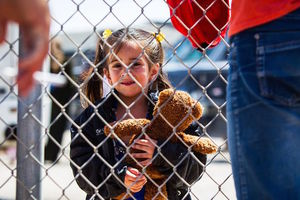
Religion is always a touchy subject. It seems to be all about taking sides – defending on and condemning all others. I would rather talk about faith and spirit. There are two points to this article. The first is that the recent attacks against Muslims in Europe are atrocious and the second is that, despite these attacks, Chritianity is still by far the most persecuted faith in the world.
The basic anti-Muslim issue in Europe is that there are now so many Muslims in Europe, that the culture of many countries there is changing. Some Europeans are reacting with hate. In 2016 alone, French police conducted unauthorized raids on Muslims, a Muslim prayer hall was vandalized in Corsica, two men were arrested in the UK after throwing bacon at Muslims, a Paris shop was ordered by authorities to stock pork and alcohol or be shut down, the Czech President caused arms sales to surge in the Republic after suggesting Muslims were planning a “super holocaust,” an anti-Islamophobia group were abused and threatened at the Conservative party conference and the Center for the Analysis of Social Media found Islamophobic tweets had reached an all-time high.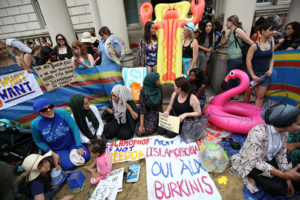
Moreover, the burkini was banned at beaches across Europe, Muslim communities in many countries were subjected to heightened levels of abuse, then-Presidential hopeful Donald Trump called for the spying upon and torture of Islamic terror suspects, and a French mayor dispatched police to an elementary school after it added Arabic to its language curriculum.
(Left) Protesters demonstrate against France’s ban of the burkini, outside the French Embassy in London, Britain August 25, 2016.
In the dark, early hours of Monday morning, 47-year-old Darren Osborne of Cardiff allegedly drove a large cargo van into a crowd of Muslims leaving Ramadan prayers at a north London mosque. The attack left at least one person dead and 10 injured in an incident British authorities are treating as an act of terrorism. The attack, which occurred in the Finsbury Park neighborhood, only a few days since an alleged neo-Nazi in the Swedish city of Malmö plowed into a demonstration of around 20 to 30 Iraqi refugees protesting the Nordic nation’s new asylum laws.
Left) Local people observe prayers at Finsbury Park where a vehicle struck pedestrians in London Monday, June 19, 2017. Police say a vehicle struck pedestrians near a mosque in north London, leaving several casualties and one person was arrested. (Yui Mok/PA via AP) (PA)
While terror attacks perpetrated by the Islamic State – or those who share the Sunni Muslim group’s ideology – have received widespread coverage in the media and generated huge amounts of public outcry, the same cannot be said for the violence directed at Muslim communities around the world. Yet across the U.S., hate crimes aimed at the Islamic community have spiked in the last few years – from a Muslim woman in Milwaukee being beaten for wearing a hijab to a Long Island woman’s car being vandlaized with the words “Trump” and “Islam” etched onto the vehicle.
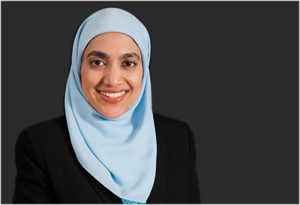
“How we talk about Muslims and what we hear about Muslims is always about terrorism,” Rabiah Ahmed, the director of media and public affairs at the Muslim Public Affairs Council, told Fox News. “So there is no wonder that there is now a backlash against our community.”
(Left) Rabiah Ahmed
Over the last few years, anti-Muslim violence in the United States alone has risen to levels not seen since the days following the Sept. 11, 2001, terror attacks. A report by the Council on American-Islamic Relations (CAIR) found that hate crime incidents directed at Muslims jumped 44 percent – from 180 to 260 – between 2015 and 2016, and that number is expected to go higher this year.
“I’ve never seen anything like it,” Ibrahim Hooper, a CAIR spokesman told Fox News. “Even after 9/11 it wasn’t this bad. Back then there was Islamophobia for sure, but it  was on the fringe, but now it’s in the mainstream, it’s in the White House.” Hooper is one of many activists in the Islamic community who point to a connection between the escalation of attacks on Muslims and the upward political trajectory of Donald Trump. Both on the campaign trail and now in the Oval Office, President Trump’s rhetoric toward Muslims and combating terrorism – especially his controversial call to ban refugees and immigrants from six majority-Muslim countries from entering the U.S. – has both bolstered support among some of his supporters and worried many in the U.S. Islamic community. “The polarization of the political spectrum is creating a really dangerous situation,” Ahmed said. “A lot of people feel more emboldened by the type of rhetoric being espoused now.” Ahmed added: “It’s a very scary world we live in.”
was on the fringe, but now it’s in the mainstream, it’s in the White House.” Hooper is one of many activists in the Islamic community who point to a connection between the escalation of attacks on Muslims and the upward political trajectory of Donald Trump. Both on the campaign trail and now in the Oval Office, President Trump’s rhetoric toward Muslims and combating terrorism – especially his controversial call to ban refugees and immigrants from six majority-Muslim countries from entering the U.S. – has both bolstered support among some of his supporters and worried many in the U.S. Islamic community. “The polarization of the political spectrum is creating a really dangerous situation,” Ahmed said. “A lot of people feel more emboldened by the type of rhetoric being espoused now.” Ahmed added: “It’s a very scary world we live in.”
The anti-Muslim trend is also being stoked by the rising tide of populist politicians across the continent, some of whom say the influx of Muslims threatens European economies and employment. In Hungary, where unemployment is less than 5 percent, Prime Minister Viktor Orban has already completed one of Trump’s campaign proposals in his own country by building a border fence to keep migrants out, and leaders from the far-right German political party Alternative for Germany have encouraged officers to “use firearms if necessary” to prevent migrants from illegally entering the country. (PerCuImage)As the incident in Malmö highlights, instances of anti-Muslim violence are not isolated to the U.S., but recently appear to be spreading in Europe. The 2016 European Islamophobia Report, featuring the work of 31 scholars across the continent, found that much of the violence directed toward Muslims can be attributed to the arrival of thousands of refugees fleeing war-torn nations in the Middle East and North Africa. In Germany, which took in more than 1 million asylum seekers in 2015 alone, there were 1,031 anti-Muslim attacks in 2015 and more than 3,500 last year.

Prime Minister of Hungary, Viktor Orban
“There appears to be a positive relationship between a nation’s economic well-being, or lack thereof, and the growth of populist right-wing political parties that scapegoat Muslims and immigrants for society’s perceived ills,” wrote Engy Abdelkader, a professor at Georgetown University’s Edmund A. Walsh School of Foreign Service. “Ultimately, however, threats and acts of anti-Muslim violence in a number of European contexts increasingly demonstrate more than a simple sense of dissatisfaction with political, social, or economic challenges. Rather, they reveal a sense of increasing hatred toward Muslims as a people.”
Of all Muslims, experts contend that women have it the worst when it comes to both violence and harassment. Whether it is the controversy surrounding the so-called “burkini ban” on French beaches in 2016 or the attack on the woman in Wisconsin, female Muslims appear to be easy targets for anti-Islam extremists.
“It’s a particularly scary time for Muslim women who wear traditional garb,” Hooper said. “There is a great deal of tension in the American Muslim community. These types of things seem to happen on a daily basis now. It’s frightening.”
Every time an act of terror or shooting occurs, Muslims closely watch the news with extreme trepidation praying that the suspect is not Muslim. This is not because these terrorists are likely to be Muslim but rather because in the instances where they happen to be, we see amplified mass media coverage and extreme unjustified hatred towards Muslims.
As of 2010, Christianity was by far the world’s largest religion, with an estimated 2.2 billion adherents, nearly a third (31 percent) of all 6.9 billion people on Earth. Islam was second, with 1.6 billion adherents, or 23 percent of the global population. There is a tendency in the American media and therefore in the minds of most Americans that most terrorist acts are caused by Muslims. The truth is that more innocent Muslims are killed by radical terrorists than any other group and Americans in general are apathetic about Muslim deaths. There are 3.3 million Muslims in the United States and 94% of all terrorist attacks in the U.S. from 1980 to 2005 have been by non-Muslims. There have been over one thousand terrorist attacks in Europe in the past five years and less than 2% were by Muslims. Worldwide there have been 140,000 terror attacks committed worldwide since 1970. Muslims were only responsible for a very small percentage of these but even if there were responsible for all of them, those terrorists would represent less than 0.00009 percent of all Muslims. You are more likely to be struck by lightening in your lifetime than a Muslim is likely to commit a terrorist attack during that same timespan. Five out of the past 12 Nobel Peace Prize winners have been Muslims.
It is ludicrous to even speculate that an entire religious group of being violent or dangerous. Yes, there are violent Muslims who believe the credo that every person on the planet must convert to Islam. Those factions basically have the viewpoint of the Borg, a fictional alien group that appear as recurring antagonists in the Star Trek franchise.
 On a side note (and mostly because I love science fiction), the Borg were a vast collection of “drones”, or cybernetic organisms, linked in a hive mind called “the Collective” or “the Hive”. The Borg co-opt the technology and knowledge of other alien species to the Collective via a process of “assimilation”: forcibly transforming individual beings into drones by injecting microscopic machines, or nanoprobes, into their bodies and surgically augmenting them with cybernetic components. The Borg’s ultimate goal is “achieving perfection”. The Borg have become a symbol in popular culture for any juggernaut against which “resistance is futile”. TV Guide named the Borg #4 in their 2013 list of the 60 Nastiest Villains of All Time. Aside from being recurring antagonists in The Next Generation television series, they are depicted as the main threat in the film Star Trek: First Contact. In addition, they played major roles in the Voyager series and serve as the way home to the Alpha Quadrant for the isolated Federation starship USS Voyager. The first encounter between humans and the Borg is depicted in the 2nd season of the series Enterprise in the episode “Regeneration” in which the phrase ‘you will be assimilated; resistance is futile’ is heard by the crew of Starfleet’s starship USS Enterprise for the very first time. There actual slogan was “Resistance is Futile,” but they have become strongly connected to the phrase “Assimilate or Die”. No, the Borg do not say this, they say “We are the Borg. You will be assimilated. Resistance is futile.”
On a side note (and mostly because I love science fiction), the Borg were a vast collection of “drones”, or cybernetic organisms, linked in a hive mind called “the Collective” or “the Hive”. The Borg co-opt the technology and knowledge of other alien species to the Collective via a process of “assimilation”: forcibly transforming individual beings into drones by injecting microscopic machines, or nanoprobes, into their bodies and surgically augmenting them with cybernetic components. The Borg’s ultimate goal is “achieving perfection”. The Borg have become a symbol in popular culture for any juggernaut against which “resistance is futile”. TV Guide named the Borg #4 in their 2013 list of the 60 Nastiest Villains of All Time. Aside from being recurring antagonists in The Next Generation television series, they are depicted as the main threat in the film Star Trek: First Contact. In addition, they played major roles in the Voyager series and serve as the way home to the Alpha Quadrant for the isolated Federation starship USS Voyager. The first encounter between humans and the Borg is depicted in the 2nd season of the series Enterprise in the episode “Regeneration” in which the phrase ‘you will be assimilated; resistance is futile’ is heard by the crew of Starfleet’s starship USS Enterprise for the very first time. There actual slogan was “Resistance is Futile,” but they have become strongly connected to the phrase “Assimilate or Die”. No, the Borg do not say this, they say “We are the Borg. You will be assimilated. Resistance is futile.”
The phrase “assimilate or die” actually comes from Josiah Strong, a celebrated evangelical preacher from 130 years ago, Strong was a chief ideologue of American empire who offered this stark choice to the “inferior races” the United States would encounter as it fulfilled its “manifest destiny” across the seas. Their only hope would be a “ready and pliant assimilation” to the wishes of the new, “peculiarly” vital and aggressive Anglo-Saxon-Christian civilization bursting forth from the United States. Assimilate or die — in Strong’s terminology, become “extinct” — those were the only alternatives for the weaker races in what Strong, in most respects no fan of Charles Darwin, believed was a contest that could only be described as the “survival of the fittest.” This idea was carried out in the official French colonial policy, particularly in Algeria, where the “assimilation” of Muslims into modern French culture was encouraged. Strong’s admonishment to assimilate meekly or die was the reality the conquered Muslims faced.
Despite these persecutions against Islam, Christians are the “most harassed and intimidated” religious group in the world, being routinely persecuted for their beliefs, a European Parliament report has found – a judgement seemingly at odds with high and rising levels of Islamophobia documented in Europe over 2016. While other faiths are mentioned in the European Parliament report — it condemns “all acts of violence and persecution, intolerance and discrimination” against every religious group — the presence of religions such as Hinduism, Judaism and Islam is slight in comparison to Christianity
The Annual Report on Human Rights and Democracy in the World suggests Christians are currently the world’s most harassed and intimidated religious group, including in Europe, and are said to “routinely suffer religiously motivated persecution.” It also notes that some of the globe’s oldest Christian communities are in danger of disappearing, particularly in the MENA region. As a result, the report calls on the UN Security Council (UNSC) and the International Criminal Court (ICC) to investigate violations committed against Christians, and the EU and its Member States to improve legal protections for them.
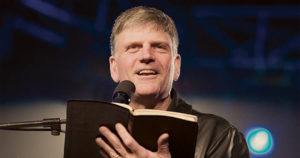 It also alleges there are serious implications for Turkish Muslim converts to Christianity, as they often experience intense pressure to return to Islam. Noted evangelist and son of Billy Graham, Franklin Graham (Left) recently tweeted ( @Franklin Graham ) “”For the third year in a row, the modern persecution of Christians worldwide has hit another record high.”
It also alleges there are serious implications for Turkish Muslim converts to Christianity, as they often experience intense pressure to return to Islam. Noted evangelist and son of Billy Graham, Franklin Graham (Left) recently tweeted ( @Franklin Graham ) “”For the third year in a row, the modern persecution of Christians worldwide has hit another record high.”
The findings echo those of Open Doors’ World Watch List, which examines levels of Christian persecution worldwide. Its analysis for 2017, claimed that for the fourth year in a row, the level of persecution had risen overall, particularly in Asia. It concluded Christians “live their lives against varying levels of discrimination, discovery, violence and threat of arrest” the world over. No European countries are included in the World Watch List, although Turkey stands at 37, having climbed eight places since 2016. It states that since the failed coup of July 2016, the level of intolerance against Christians has “intensified,” as Turkish nationalism, combined with “increasing Islamization” of Turkish society, means the tiny minority of Christians in the country “face growing pressure, which increasingly translates into violent incidents.”
The Open Doors World Watch List is an in-depth record of the 50 countries where it is most difficult to live as a Christian. These are the places where followers of Christ must keep their beliefs hidden and where living the gospel means facing beatings, imprisonment, discrimination and abuse.
For the fifth year in a row, the level of overall persecution has risen. North Korea remains number one on the list – but only just. Afghanistan is only one point below it. India – the world’s largest democracy – has risen to its highest ever position of 11, as Hindu nationalists continue to attack other religious minorities. Islamic extremism continues to strangle the expression of the Christian faith, fuelling persecution in eight out of the top ten countries.
The Top Fifteen Countries on the list are as follows: Levels of persecution: Extreme Very High High
2 Afghanistan
3 Somalia
4 Sudan
5 Pakistan
6 Eritrea
7 Libya
8 Iraq
9 Yemen
10 Iran
11 India
12 Saudi Arabia
13 Maldives
14 Nigeria
15 Syria
As persecution increases, so do the needs of our brothers and sisters. In over 50 countries around the world, Open Doors’ underground networks are providing persecuted believers with Bibles and Christian literature, theological training, emergency relief, livelihood training, trauma care and advocacy support. But none of this work would be possible without the generosity and commitment of our supporters.
The harassment of Christian refugees in European asylum centers remains very high. Some Christian asylum seekers escaping from violence and persecution in their homelands are victims of harassment by extremist Muslims in European refugee centers. In Europe, there is a general understanding that asylum seekers are fully protected when they reach our continent. But some reports about extreme Islamist asylum seekers harassing and acting violently against Christian peers in refugee centres in Germany, the Netherlands, France and Sweden have been made public recently; and there could be more cases in other countries.
Christians have been subject to pressure to practice Ramadan and have been threatened when they wear Christian symbols or possess bibles. Physical violence has been used in certain cases against them and many even fear for their lives. Moreover, Christian women and children are particularly vulnerable to sexual assault. This phenomenon of harassment is extensible to Muslims converted to Christianity, who are also potential victims of threats and coercion: hundreds of conversions are taking place, e.g. in Denmark and Germany mainly of Iranians and Afghans. At the same time, other circumstances such as limited capacities and poor conditions in reception centres or cultural differences exacerbate tensions among diverse groups.
Max Klingberg, of the International Society for Human Rights, has stated that “we must rid ourselves of the illusion that all those who arrive here are human rights activists. Among the new arrivals (…) religious intensity is, at least at the level of the Muslim Brotherhood.” The fear and danger in Europe is that tensions and violence among diverse religious groups existing in their countries of origin could be imported to the EU (including the longstanding Shiite/Sunni conflict). This violence affects in particular Christians and Yezidis, both considered by the Parliamentary Assembly of the Council of Europe and the European Parliament, along with others, victims of genocide in Iraq and Syria by “ISIS”.
Limited visibility has been given to these situations of anti-Christian violence in refugee facilities due, among other reasons, to lack of interest and political correctness that make people afraid of being accused of xenophobia. In this regard, last 25 February, Commissioner Dimitris Avramopoulos answered to a parliamentary question on this issue saying that “the Commission is not aware of specific incidents of public incitement to violence or hatred or bias-motivated violence directed against Christian migrants housed in reception centres for asylum-seekers on the EU territory”. Criminal prosecution of alleged manifestations of anti-Christian sentiment is a Member States’ competence: they –and not the EU- must monitor, investigate and prosecute bias-motivated criminal offences; but when this happens, the EU shouldn’t remain silent, as it doesn’t in other cases where the EU has no competence.
To take appropriate measures to prevent assault, including sexual assault, and harassment in reception centres is an obligation by EU Member States under Article 18.4 of the Reception Conditions Directive. In this line, Jörg Radek, deputy head of Germany’s police union has suggested that “housing separated according to religion makes perfect sense,” a proposal followed by the German State of Thuringia, which became last year the first to accommodate refugees separately by country of origin. Moreover, Article 8 of the Directive on Victims’ Rights foresees the right for the victims to support services. But this is not enough: the victim is entitled to “a thorough and effective investigation capable of leading to the identification and punishment of those responsible.” Moreover, any asylum seeker harassing and threatening another peer is committing a crime; in those cases Articles 14 and 19 of the Qualification Directive -that determines who qualifies as refugee, could disqualify those convicted for such offenses from benefitting from international protection.
It would be good if the media and civil society was more outspoken about the hate crimes against Christians and other asylum seekers, who are harassed and coerced because of their religious affiliation. Furthermore, neither the EU nor its Member States should remain inactive when these crimes take place. Investigations and prosecution should be carried out with all guarantees, and law should be properly applied, including revoking international protection to criminals. Moreover, improvement of reception capacities and cultural mediation could help to reduce tensions in asylum centers.
But the bottom line is there will always be persecution. Mathew 10:22 quotes Jesus as saying You will be hated by everyone because of me, but the one who stands firm to the end will be saved. But He also said in Mark 10:29 Truly I tell you, no one who has left home or brothers or sisters or mother or father or children or fields for me and the gospel will fail to receive a hundred times as much in this present age: homes, brothers, sisters, mothers, children and fields—along with persecutions—and in the age to come eternal life.
And, in the end, a brief summary, all persecution is wrong, particularly all religious persecution. As Mark Twain said at the end of Chapter 28 of Huckleberry Finn, “You pays you money and you takes you choice.”
___



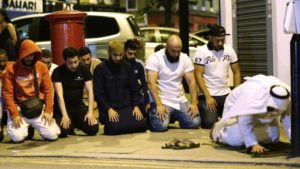
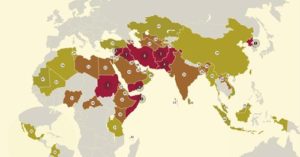
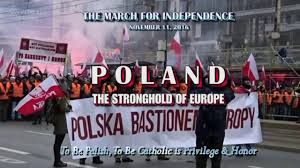


No Comment